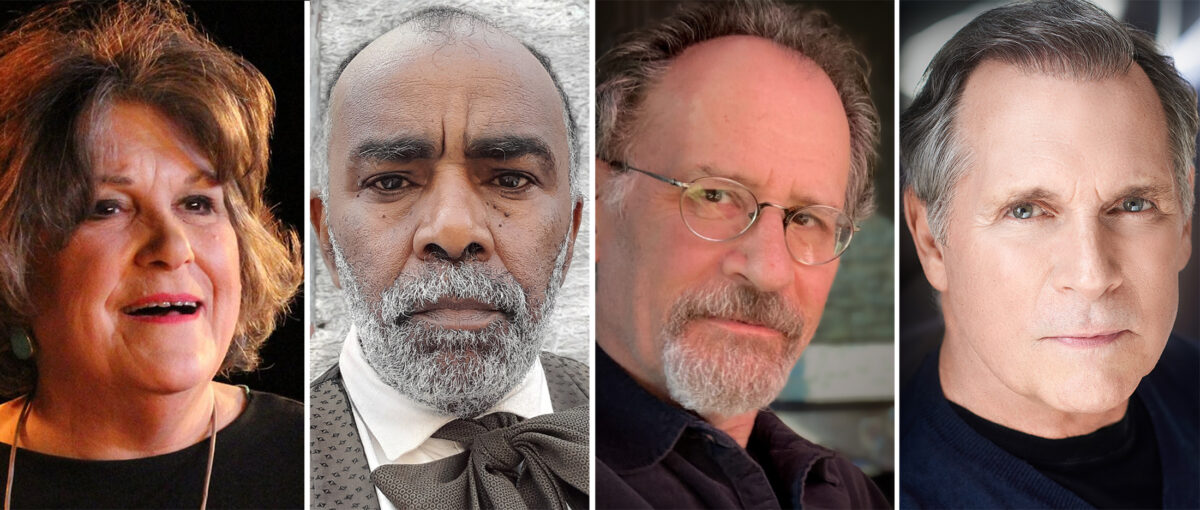Let’s say you’re watching a TV show, a crime drama, perhaps, with well-known stars in the lead roles. Halfway through the episode, a new character enters the story. It’s a serious-looking psychiatrist trying to determine a suspect’s mental health or a crafty defense attorney arguing what appears to be a hopeless case. The characters deliver several lines that propel the story forward, and then, after a scene or two, they’re gone.
Do you ever wonder: Who’s playing that role?
Until recently, it’s been easy to answer “no.” That changed July 14 when the actors union, SAG-AFTRA, went on strike. That action thrust these “middle-class” actors — who appear in films on theater screens, television shows and streaming services productions — into the news. We saw them in news conferences and giving interviews on picket lines.
Turns out, those who play smaller roles in TV shows and movies, showing up in the background as police officers or office workers or protestors, make up the vast majority of professional actors.
They’re not rich, and they don’t live in Hollywood mansions. Often they don’t even live in Hollywood. A number, in fact, call Pittsburgh their home.
The Pittsburgh Union Progress talked at length with four such Pittsburgh-based actors who’ve been in the profession for decades. We wondered, how to you become an actor? What are the joys, the challenges? What are the concerns about the profession’s future? Here is what we learned.
• • •
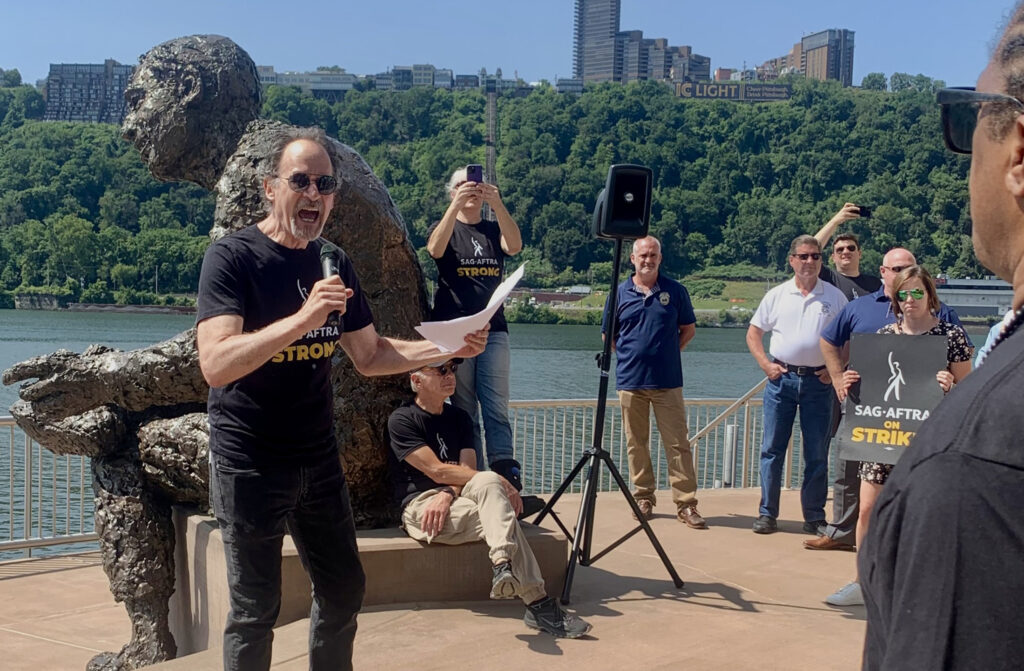
Randy Kovitz spent his high school years in the California city of Claremont, east of Los Angeles. This was in the late 1960s — the hippie era. You know, flower power, “Make love not war.”
Those days had a dark side, as Kovitz soon discovered. At the time, he was trying to find his place in the world. His family had moved every four years. He was desperate to fit it. He played in bands, smoked weed, fought constantly with his parents, hung out with friends, some of whom later became alcoholics and junkies. A few would die before finishing high school.
Kovitz got lucky. In ninth grade he faced a seemingly benign choice of classes. He could take a course focused on science or one on stagecraft. He picked the stagecraft course, thinking it would be easy. He was wrong.
On a high school production of “Camelot,” Kovitz worked backstage, operating spotlights and working the “fly rail” — pulling ropes that raised and lowered scenery and backdrops. More importantly, he discovered the camaraderie that’s a part of theater.
“For a kid feeling lost, just being a part of that — hearing the kudos from the director, everybody holding hands and hugging after the show — that was new to me. It was attractive to me, the sense of belonging,” he said.
Next, he auditioned for a part in his school’s production of “Guys and Dolls” and was cast as gambler Big Jule. He was a 14-year-old kid who got to smoke a cigar on stage. The audience ate it up. Kovitz was hooked.
“It doesn’t get any better than that — the sense of freedom, the flaunting of authority,” Kovitz said. “After the show on opening night, I just knew. I came off the stage and said, ‘This is what I want to do.’”
After graduation, he was accepted at Carnegie Mellon University’s School of Drama. He’d been a star at Claremont, but at CMU he found out every student was a former high school star. Some had already performed on Broadway.
In spring 1977, after graduation, Kovitz landed a role in George Romero’s film “Dawn of the Dead,” a horror classic. He played a police officer desperate to get out of a city overrun with zombies. After a lifetime of roles, it remains the one Kovitz is best known for. But it was a non-union gig, so he’s never received a penny in residuals from the film.
Kovitz was also in Romero’s next film, “Knightriders.” This one was a union production, so Kovitz was paid well and received health insurance and a pension credit. It became clear to him then why unions existed.
Kovitz’s career as a union actor spans several decades. If you’ve spent any time in front of a TV or movie screen the past several years, you’ve probably seen his work. His TV credits include the 1980s network classic “Hill Street Blues” and staples of 1990s television — “Seinfeld,” “Frasier,” “Home Improvement,” “Chicago Hope” and “ER.” His more recent work includes roles in the TV sitcom “Parks and Recreation” and streaming programs such as “American Rust,” “Manhunt: Deadly Games” and “The Marvelous Mrs. Maisel.”
In addition to “Dawn of the Dead,” his film credits include “Concussion” and “The Fault in Our Stars.” On stage, he’s performed on Broadway and, locally, at Pittsburgh Public Theater, barebones productions and Quantum Theatre. He’s also a stunt coordinator, a fight director and an award-winning filmmaker.
He’s been fortunate, he says, to work as much as he has over the years. But it hasn’t made him rich. In that way, he’s like the vast majority of actors.
“I am not wealthy or even close to it,” he said. “Some people think that working as an actor means that you earn huge amounts. This is simply not true. I am a middle-class actor. I drive a 16-year-old car, pay a mortgage, save my money, and deal with all of the issues that working-class people have to navigate to make ends meet and plan for the future.”
Will actors be able to continue earning a living as the film industry evolves? That question is at the heart of the SAG-AFTRA strike. Union members (they number about 65,000) are concerned with the two main issues: residual payments and the use of artificial intelligence.
Residuals are payments made to actors for the use of a television show or movie after the actor is initially paid and the show is re-aired or is released in another form — on DVD, for example.
These payments, negotiated by the union, are key for SAG-AFTRA members who aren’t big stars. Residuals help actors to buy groceries and meet meet day-to-day financial obligations such as rent.
Kovitz receives residual checks for his work on network shows dating back to the 1980s. But more and more union work these days is with streaming services such as Netflix and Hulu. Those streamers refuse to reveal the amount of viewers for each show and pay a flat rate for residuals, no matter the viewership. Residuals for network shows, by contrast, are based on the number of times an episode is aired.
What this means is that actors in streaming shows get paid the same amount, no matter whether the show becomes a hit or flops. The payments can be ridiculously paltry — one star in the drama “Orange Is the New Black” reported a total of $27.30.
“The charts I’ve seen show that 97% of the profits from streaming go to the studios,” Kovitz said. “They are nickel and diming us.”
The studio’s intransigence on increasing residual payments is especially galling to union members, given the amount paid to studio heads. The Los Angeles Times reported in May that the average pay for Hollywood’s top executives has risen 53% — to $28 million — between 2018 and 2021. During that time, David Zaslav, the CEO of Warner Bros. Discovery Inc., received $498,915,318 — nearly half a billion dollars.
“The optics for the studios are horrible,” Kovitz said.
Actors are also concerned about the ability of computers to use actors’ images to artificially generate performances. Studios will use this technology to save money by not paying actors, the union fears.
“If you pay a background actor $100 or $150 for a day of work to capture their image for use as an artificial background person, that actor gives up their rights in perpetuity for their image,” Kovitz explained. “If you’re doing a movie and you bring in few hundred extras for one day of work, you won’t need them back. That has a ripple effect. Not only do the actors get no more work, [but also] the costume crew, makeup, hair, the people who provide food, transportation — those people also don’t get work.”
AI and its erosion of actors’ rights to own their images poses an existential threat.
“It’s very important we win this fight,” Kovitz said. “If we don’t, our profession may not exist as we know it in the future. They won’t need us.”
But it’s not just about rights and compensation. AI also erodes the quality of the work viewers will see.
“There is something that happens between actors in a scene that is not reproducible by a machine,” Kovitz said. “When you have a moment of creative energy between actors on screen, that’s something actors are not planning. It happens because of the skill, the training, the chemistry, the openness to the creative process. It would be impossible for an algorithm to create that.”
Shortly before SAG-AFTRA members joined the strikers with Writers Guild of America on the picket line, Deadline reported the studio’s strategy in dealing with the labor issue: bleed out the workers. “The endgame is to allow things to drag on until union members start losing their apartments and losing their houses,” said one studio executive in the July 11 story.
The comment is disturbing for Kovitz.
“Forty years ago people who ran studios were producers. They knew about scripts and how to tell a story. They appreciated the artistic side of the process,” he said. “But now they’re run by people from the corporate world who are beholden to shareholders and profit rather than the artists they employ. I think, ironically, that the industry would make more money if they treated the creative people better and trusted them to come up with great films. ‘Barbie’ is a good example of this — an artist’s interpretation of a commercial idea that is both satisfying to audiences and profitable.”
• • •
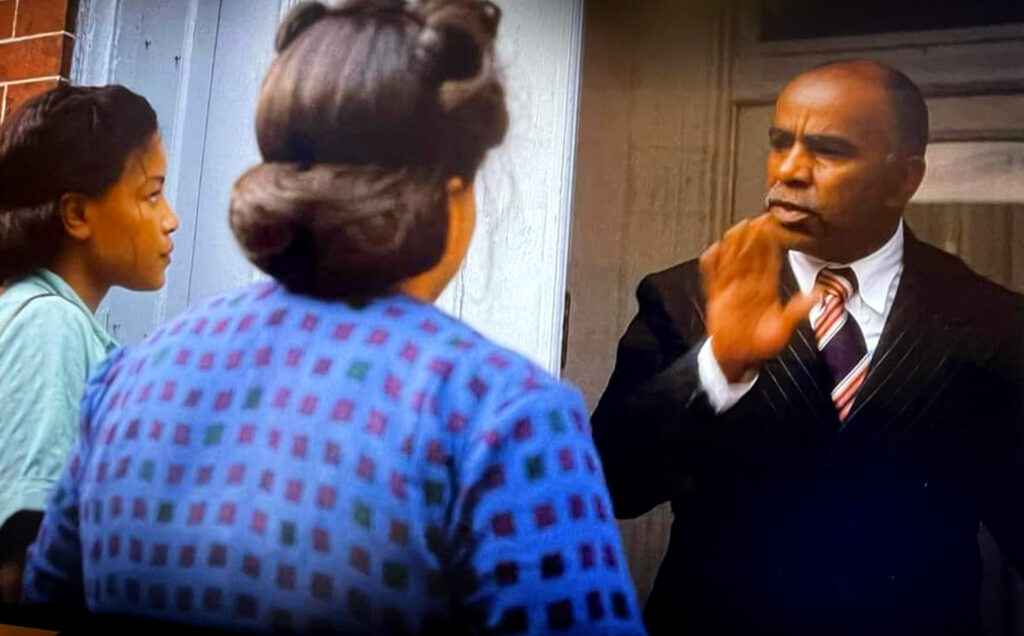
James Howard followed a nontraditional path to acting. In the late 1990s, he was living in the Pittsburgh area and working as a car salesman when his brother Les, an actor who’d moved here from Los Angeles, suggested that James audition for a part in a television miniseries called “The Temptations.”
Howard thought “acting?” That was his brother’s thing. Les always wanted to be an actor, and his family — the brothers are two of 10 children — supported him, although nobody thought it would amount to anything. People who grew up in working-class households in 1960s Washington, D.C., couldn’t make a living as actors. It was inconceivable.
Still, Howard decided to give it a shot.
So he auditioned and was hired to appear in a few background scenes. He drove to a Trafford studio for the miniseries filming, which was a biographical look at the famous Motown act, and saw a sign on the building: Pinnacle Studios. To Howard, it felt like Hollywood.
He found the production process exciting — all those lights, the period wardrobes, the sets, the actors. But after three days, he grew disenchanted. He was placed so far in the background in scenes that he couldn’t find himself. It seemed a waste of time.
“This sucks. I’m not coming back,” he thought.
Then the producers called Howard and said they had something more for him — a featured role, which meant he’d get camera time. He returned to the studio and was cast in several different roles — a recording technician, a background actor, a musician. “That’s when I got the bug,” he said.
So began a decades-long career with roles in movies, television series and commercials. He’s done a lot of work as a background actor, his “bread and butter.” At times, the work takes him to Washington, D.C., or Baltimore, where he earns union rates that include pay bumps for working at night or in scenes with smoke or rain. Howard received his union card two decades ago.
Two recent examples are the motion pictures “Wonder Woman 1984” and “Captain America: The Winter Soldier,” with scenes from both filmed in Washington, D.C.
“Sometimes I can make $1,000 a day for union work,” he said. “If I can work three or four weeks straight on something like ‘Captain America,’ it really adds up.”
Howard has worked on two film productions of August Wilson plays. First was “Fences,” with Denzel Washington and Viola Davis. Principal filming took place in the Hill District in 2015. He played a neighbor of the principal characters, Troy and Rose Lee Maxson. In 2019, Howard worked with Davis and Chadwick Boseman on “Ma Rainey’s Black Bottom.” In that film, he worked as a stand-in for Emmy-winning actor Glynn Turman, who portrayed an older piano player.
For Howard, both films meant six weeks of union work and an opportunity to observe some of the most talented actors in the business.
“Denzel is very down to earth,” Howard said. “Viola is a strong workaholic. And Chadwick was very quiet and graceful. It was nice to meet these people, shake their hands and to see they’re just human beings like you and me.”
Howard played a crooked homicide detective in the 2018 crime drama “White Boy Rick,” which starred Matthew McConaughey. He’s been in “American Rust” and “A League of Their Own.” He relishes speaking roles, even if they involve only a few lines, but the smaller roles are fulfilling as well, he says.
“It’s like making a painting,” he said. “You have a vision, and you can make it a reality. You have the freedom to absorb and interpret any kind of character, no matter whether it’s a character people love or hate. It’s rewarding to create a performance that’s memorable, no matter how brief.”
The profession has its challenges. For two decades, Howard continued to sell automobiles while working as an actor. There simply wasn’t enough acting work to pay the bills. His employer allowed Howard to arrange his schedule to accommodate auditions and acting work. Howard has retired from auto sales, and at 65, acting is his primary job.
The strike has made it tough. He receives residuals from his past movie roles, and he’s getting some modeling gigs for commercial print advertisements, something he’s done for years. But otherwise, acting work has dried up. “And what little can be done is more highly competitive because nobody is working,” he said. But Howard’s sticking with it.
“Acting has taught me to go after what you want,” he said. “Life is short. My life is my story. I’m the author, [so] let me write what I want. I try to forge life for myself instead of letting it happen to me.”
Maybe his acting story, he says, can inspire others.
“People will see me on TV and say, ‘How’d you do that?’ ” he said. Acting in films “is a different world. People don’t think they can enter those worlds, but they can. I talked to Denzel Washington’s stunt double. He’s from Watts. I said, ‘How does a guy from Watts become a stunt double?’ He told me that he once saw a friend he went to school with on a soap opera. That was an eye-opener for him. It showed him that it can be done. Someone like us can do this. It breaks the barriers down.”
***
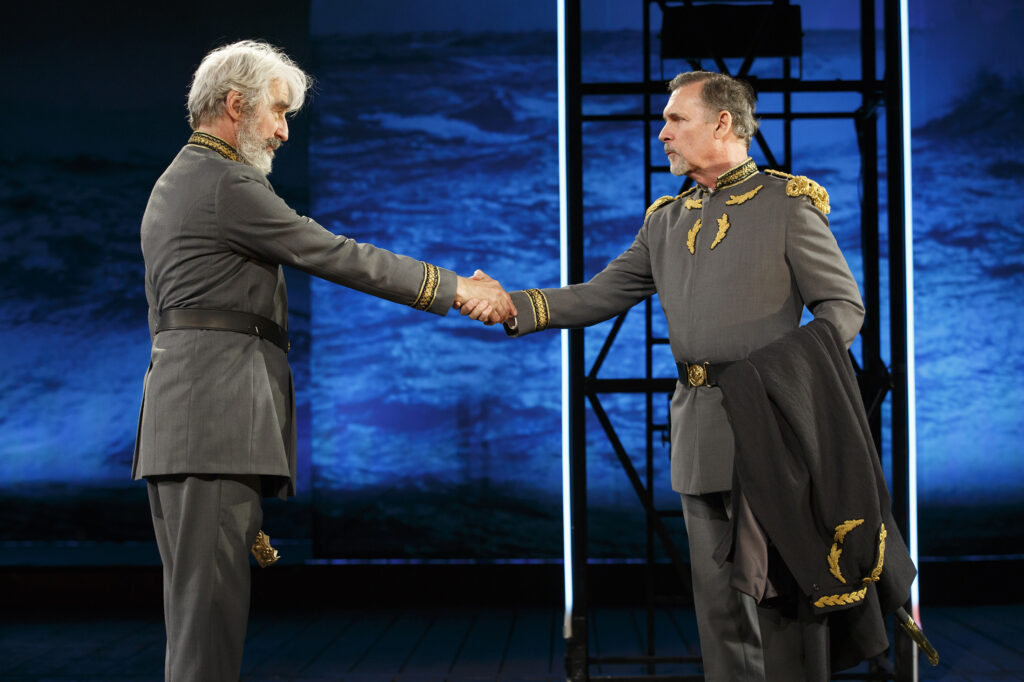
Cotter Smith grew up in a Washington, D.C., house heavy with the weight of law. His father, John Lewis Smith Jr., served as chief judge for the U.S. District Court for the District of Columbia, and his brother John Lewis Smith III earned a law degree from Princeton and joined a prominent Washington law firm.
Law wasn’t for Smith, though. After high school, he headed to Trinity College in Hartford, Connecticut, to work toward a literature degree. One day a friend asked Smith to accompany her as she auditioned for one of the school’s theatrical productions. She was nervous and wanted support. The director asked Smith to audition, then offered him a role.
Over the next few years, he performed in a dozen college productions. Being on stage, playing a role, moved him. He felt very comfortable on stage, acting. “I head a sense of being home,” he said. “I thought, ‘I’m somehow meant to do this.’”
But doing it for a living? Nah. That just didn’t seem possible for him.
After graduation, Smith planned to write and teach, most likely at a university, but first he “kicked around” for a few years. It was during this time that he realized he was missing something: acting. It kept gnawing at him.
Onstage, “a mystical thing happens,” he said. “It’s a strange thing to do — inhabit other spirits and souls, to take them in through your own form of osmosis. It’s really a beautiful process.”
So he took a leap and entered Washington’s thriving theater scene and, in the mid-1970s, began what he calls a “self-styled apprenticeship.” Smith wasn’t making any money, but he loved it.
Two years later, in 1978, he moved to New York — “on a wing and prayer,” as he says. He was admitted into Stella Adler’s legendary acting school. This was a big deal. Adler alumni include Marlon Brando, Robert De Niro, Mario Van Peebles and Candice Bergen.
Adler was inspirational and “felt that actors were on a par with doctors and priests when it came to the kind of balm and healing they gave to society,” Smith said. “When you think about the number of people who watch performances and learn something about life, it’s enormous.”
Things happened quickly for the young actor. In 1979, Smith landed a role in the off-Broadway play “Blood Knot” by Athol Fugard about interracial brothers in South Africa. The play had only two characters. The other was Danny Glover.
Next, he tried to land a role in “A Soldier’s Play.” He was advised by an agent not to accept the role. It wasn’t big enough, the agent said. But Smith loved the play, so he took a chance.
“I was one of several hundred kids given two minutes in an interview, which would decide if you would get two minutes to give two monologues, which would decide whether you could audition for the play,” he recalls.
He was offered the role of Lt. Byrd. Fellow cast members included Samuel L. Jackson and Denzel Washington. The play won the 1982 Pulitzer Prize for drama.
He went to Los Angeles with the play, and a casting director saw him and invited him to audition for the role of Robert Kennedy in a 1983 miniseries called “Blood Feud,” which centered on the conflict Kennedy had with Jimmy Hoffa. He got the role. Just like that, Smith became a working actor.
“I wasn’t striving to go L.A. to star in a television miniseries. I just wanted to do plays,” he said. “I just wanted to be an actor.”
Smith has embraced the stage, television and feature films.
On Broadway, his credits include “Next Fall,” a 2010 Tony nominee, and “American Daughter.” He’s acted in dozens of TV shows, dating from the 1980s to present. Here’s a partial list: “St. Elsewhere,” “Hill Street Blues.” “L.A. Law,” “Madam Secretary,” Netflix’s “Mindhunter.” And his film credits include “X2: X-Men United” and HBO’s “You Don’t Know Jack.” In that film, he portrays the prosecutor trying to convict Dr. Jack Kevorkian, portrayed by Al Pacino.
Smith will also appear in the upcoming “Unsinkable” about the 1912 Senate investigation of the sinking of the Titanic.
Smith describes acting as an “impossible profession unless you have a sort of light in you that gets you through the hard times … It’s not just any other job. There’s permanent job insecurity. I’ve been doing it for over 50 years, and I love it more than I ever have.”
“I’m cast to play men like my father and brother because I understand them,” he said. “Since my first film role was Robert Kennedy, I got tagged early on as ‘that guy.’ I realize that I ended up playing the kind of professional men my father wished I’d become. I was portraying lawyers and doctors and politicians and even the president a few times. The guy I play in ‘Mindhunter’ is head of the FBI — the kind of guy Dad wanted me to be.”
Smith now lives in Highland Park with his wife, Heidi Mueller Smith. He came to Pittsburgh in 2016 for the filming of “Mindhunter.”
“We were living in Manhattan,” he said. “My wife was burning out in New York — a psychiatric nurse. As soon as we got here we felt at home. It’s such a welcoming city. And I have felt very embraced by the theater community here. I’ve done four plays here already, at the Pittsburgh Public Theater, City Theatre, barebones, Bricolage. I’ve also done several films here and a couple of TV projects. There is more and more film production here, which makes sense. It’s a fantastic place to shoot.”
The strike has been difficult on actors such as Smith.
“I lost my health insurance for the first time in 30 years,” he said. “That’s happened to so many senior performers. You have to make a certain amount to qualify for insurance. Older actors who are not working as much counted on residuals to qualify for that sum. Now residual income is not counted toward that income. You have to make that with on-set working hours. And a lot of actors don’t have the working hours.”
He supplements his income by teaching workshops at a variety of places — Point Park University, Carnegie Mellon University and, most recently, City Theatre and Pittsburgh Public Theater.
Despite the problems currently embroiling the industry, Smith remains confident the unions and studios will eventually come to an agreement.
“I believe we’ll sit down as a family eventually and figure this out, but I’m concerned about the tenor of the conversation now. It’s very ugly. It should be a family conversation, not a national and public decimation of each other. That isn’t helpful.
“Now, there’s very little talking going on, just pot shots and a lot of anger. We all know it’ll ultimately be settled. Nobody wants the industry to go under. The question is, how do we share the pie?”
• • •
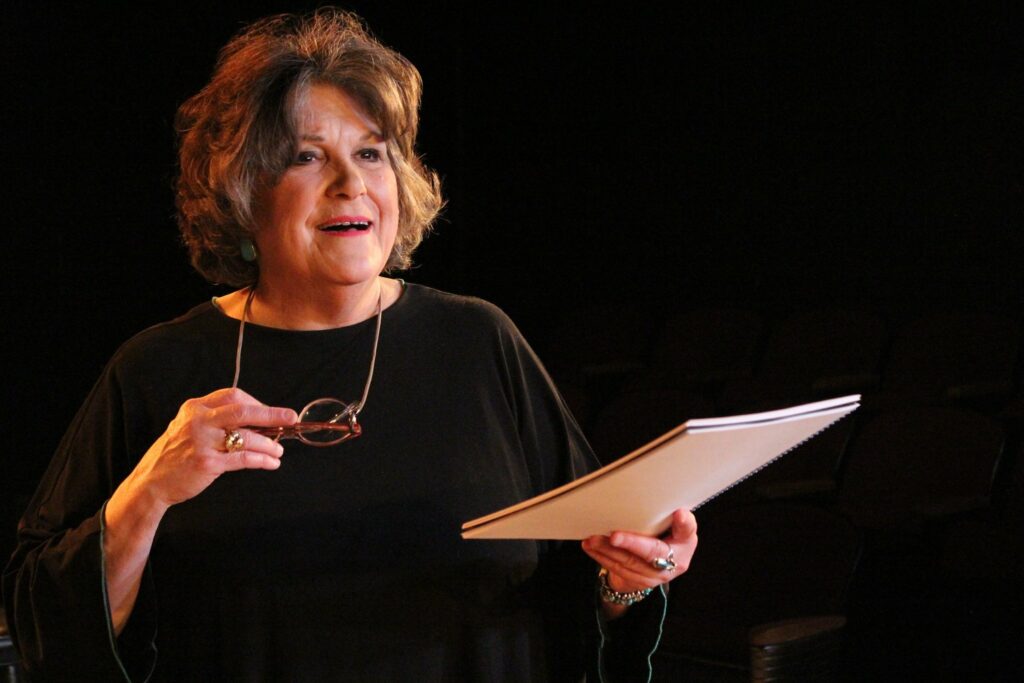
After graduating from high school in Duluth, Minnesota, Ingrid Sonnichsen considered law as a profession. The local district attorney, who was a family friend, offered discouraging advice. He told Ingrid she had a “certain superficial brightness but wasn’t intelligent enough to be a lawyer.”
So OK, that was offensive and weird. It was the early 1960s.
Defiant, Sonnichsen entered the University of Minnesota’s local campus to begin prelaw studies, but so much was happening with her family that she dropped out after a few years.
She stayed in Duluth, doing odd jobs. She worked for the U.S. Census Department, going door to door on country roads in the cold autumn months. She took a trip to San Francisco. And during the Christmas season, she worked in a local department store, taking pictures of kids sitting on Santa Claus’ lap. This department store Santa was a drinker, though, so Sonnichsen often had to prop him up, coax the kids into smiles, snap the picture and then get all of the appropriate information for billing and mailing the photos.
The next year she returned to school, this time at University of Minnesota’s main campus in Minneapolis, to pursue an English degree. At the urging of her mother, a retired professional actor, Sonnichsen had begun reading Shakespeare at age 9. She loved classical dramatic literature.
She spotted a notice for auditions for the play “As You Like it.” Years earlier, Sonnichsen’s mother had taken her to see a production of it that featured Katharine Hepburn.
“She sat on the stage, and I was so blown away,” Sonnichsen remembers. She thought it would be fun to give the play she loved a shot.
The audition went well. In fact, the director and professors sitting in on the session urged her to take acting classes. So she did and learned she had a knack for it. And she loved the community that formed around theater. In her senior year, Sonnichsen won the school’s undergraduate acting award.
She did two years of training in classical repertory at Wayne State University in Detroit and auditioned in Chicago for regional theaters. She received several offers and chose Long Wharf in New Haven. It paid the least, but Sonnichsen was attracted to the company’s national reputation.
She worked there for a year. But there was a problem. Two older women actors in the company scared the hell out of her. An actor’s life could be very difficult and stressful, she realized. She could see the toll it had taken on the two women. Sonnichsen didn’t think she was tough enough.
So she called her boyfriend in Philadelphia and said, “Let’s get married.” She moved in with him and got a job teaching acting on the top floor of a modeling school.
But the relationship with the boyfriend didn’t work out. She left Philadelphia and headed to New York to resume her acting career. In 1968, she got a summer stock job at Jennerstown in Somerset County and earned her Actors’ Equity card.
Once that gig finished at the end of summer, Sonnichsen headed to New York. She joined the Screen Actors Guild in 1969. Several months later, she joined the American Federation of Television and Radio Artists. The two unions merged decades later and became SAG-AFTRA.
Her career spans more than half a century. Much of her work has been in regional theater — the Huntington, ART and the Charles theaters in Boston; the Guthrie in Minneapolis; Ford’s Theater and the Kennedy Center in Washington, D.C.; and Pittsburgh Public Theater. She’s worked on Broadway, off-Broadway and in a number of TV commercials. She did voiceover work for a several of clients and products, including Cadillac and Ralph Lauren perfume.
For years, while living in Boston, she acted in business training films. She often played a confused office worker. Her line would be, “John, I don’t understand how this new program works,” and then “John” would mansplain everything to her.
“I played dumb and puzzled very well,” she said.
Shooting for FedEx was fun. “I got a lot of mileage out of packing weird stuff,” Sonnichsen said. “I had to show how FedEx would do it — sending a key lime pie from Hawaii. In those I wasn’t ‘dumb.’ I knew how to do things. I was the trainer.”
While she was in Boston, Sonnichsen acted and directed full time and taught as an adjunct at Harvard. There, she received the Certificate for Distinction in Teaching, which thrilled her mother.
“She had a Xerox copy of it that she carried in her wallet,” Sonnichsen said. “She was so proud. She knew what the business was like. She knew then that I was safe, and she could stop worrying.”
But by then, Sonnichsen was her late 40s. She wanted health insurance and some sort of retirement. She was tired of eating in her car.
“Life in this business gets rough for an older woman,” she said. “It’s more difficult to get roles. There are fewer written for older women. Every play has eight or nine older men and one old hag. It’s getting better now, with more women playwrights, but it’s still challenging.”
She made a life-changing decision. In 1995, at the age of 49, she accepted a teaching job at Carnegie Mellon University. She taught there for 20 years and in 2012 received the College of Fine Arts Award for Distinguished Teaching.
“I got to teach some of the best actors in the country” at CMU. “The kids were incredible. It was a great privilege.”
After more than half a century in the profession, she continues to act, direct and teach. The success of the current strike, she says, could determine the ability of upcoming actors to carve a life out of acting the way she did.
AI, she said, poses an existential threat.
“It would mean the death of our profession,” Sonnichsen said. “It’s really serious. If they can buy access to my image by paying me for one day of work and then use it in any capacity they choose, they could do anything they want. My image could be used for selling anything — booze or sex toys. It’s the complete lack of control I’d have over my work.”
AI and the issue of streaming residuals shows how little regard the studios have for actors. “It’s nonexistent,” she said. “They care about the stars. The stars represent a monetary reality they understand. Background, blue collar actors — they don’t care about them. They’re the ones who are striking: the middle-class actors who are trying to construct a life where they might actually raise a family and pay bills.”
She’s heartened by big name actors such as George Clooney and Meryl Streep, who’ve donated large sums to the strike fund.
“They haven’t forgotten where they came from, not knowing where your next job is going to come from,” she said. “It shows the sense of community among actors.”
“The actors will stay out until we get real willingness on part of these producers to negotiate. We won’t get everything, but they’ve been unwilling to really engage, and that’s shameful.”
Steve is a photojournalist and writer for the Pittsburgh Post-Gazette, but he is currently on strike and working as a Union Progress co-editor. Reach him at smellon@unionprogress.com.

